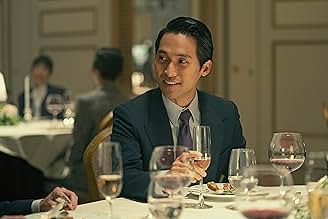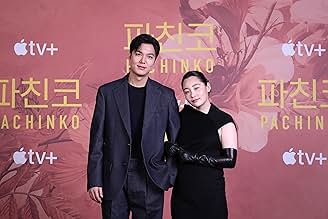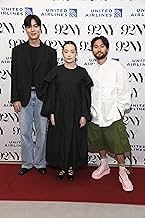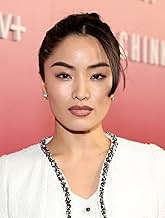Les espoirs et les rêves d'une famille d'immigrants coréens passent sur quatre générations alors qu'ils quittent leur patrie dans une quête indomptable pour survivre et prospérer.Les espoirs et les rêves d'une famille d'immigrants coréens passent sur quatre générations alors qu'ils quittent leur patrie dans une quête indomptable pour survivre et prospérer.Les espoirs et les rêves d'une famille d'immigrants coréens passent sur quatre générations alors qu'ils quittent leur patrie dans une quête indomptable pour survivre et prospérer.
- Nommé pour 3 Primetime Emmys
- 15 victoires et 24 nominations au total
Parcourir les épisodes
Avis à la une
If you've watched enough Korean dramas, you'd know that the story elements are not new revelations. They're an amalgamation of the history of Korea, and well-worn themes and stories of real lives of Koreans who've suffered at the hands of the Japanese, and the clash of cultures, attitudes, bigotry, hatred and cruelty, across Korean, Japanese and westerners. It's easy to forget that this was less than a hundred years ago, and spanning only a few decades; and so often, the bitterness still felt by Koreans leads to a heavy handed portrayal of the Japanese and westerners. It's a fine line to walk to be able tell a story about generations of a family and their personal struggles without getting lost in that bitterness.
It's so amazing so far to see how beautifully the show tells the stories across multiple timelines, with incredible actors, excellent cinematography and direction. The contrast is striking, from the primitive Korean fishing village to the urban sprawl. While the show's synopsis is about their "indomitable quest to survive and thrive", it's the story of Korea and its people as whole being told through these four generations of characters.
It's so amazing so far to see how beautifully the show tells the stories across multiple timelines, with incredible actors, excellent cinematography and direction. The contrast is striking, from the primitive Korean fishing village to the urban sprawl. While the show's synopsis is about their "indomitable quest to survive and thrive", it's the story of Korea and its people as whole being told through these four generations of characters.
When I first saw the trailers for this show my reaction was, oh no, another story about the struggles of poverty and war, and while there's a lot to that is told in a very interesting way where you can see the details of Korean lower class and it's interaction with the Japanese middle class.
I love reading subtitles to have the experience of the original actor/voice/culture so much is lost in dubbed scenes, and in this show they make sure you can understand when someone is speaking Japanese or Korean and why the miscommunication happens on normal circumstances.
The show subtitles Japanese in blue and Korean in yellow so it makes an unique experience, besides the dialogues and acting are very good.
This show explains to us (mainly westerners) the conflicts and collaborations between the Koreans and Japanese told from the Korean side and how they suffered the Japanese oppression but also how they thrived despite it, lovely show, can't wait for the second season.
I love reading subtitles to have the experience of the original actor/voice/culture so much is lost in dubbed scenes, and in this show they make sure you can understand when someone is speaking Japanese or Korean and why the miscommunication happens on normal circumstances.
The show subtitles Japanese in blue and Korean in yellow so it makes an unique experience, besides the dialogues and acting are very good.
This show explains to us (mainly westerners) the conflicts and collaborations between the Koreans and Japanese told from the Korean side and how they suffered the Japanese oppression but also how they thrived despite it, lovely show, can't wait for the second season.
First of all, I am a Korean. I've heard a lot about what Japanese people did to Korean people during the colonial era while I was growing up. That is very sad and making us Koreans furious. Because we Koreans heard a lot about similar stories, and the storyline follows actual historical events, this show feels a little cliche in my opinion. But, I think the cinematography is one of the best I've ever seen to describe the era. It is beautifully done and seems very real. Also the show's strategy to show events not by chronically, but by weaving related events through 3,4 generations is brilliant and is making the show interesting. Overall, it is worthwhile to watch, and to the people who didn't know the history between Japan and Korea, this will be a great show to understand the history and the emotions Koreans(or other countries which were impacted by Japan during the war) have.
Although I believe we Koreans need to overcome this emotions about Japan and Japanese people, Japan also needs to admit its wrong doings in the past and truthfully express their apologies.
Although I believe we Koreans need to overcome this emotions about Japan and Japanese people, Japan also needs to admit its wrong doings in the past and truthfully express their apologies.
Great cinematography, indeed- also costumes, locations, etc- technically all perfect, and very good casting. The script does not follow the book, which changes the view on characters, giving them different vibe - and also the jumping timelineis done so often and sometimes in the middle of the scene, that it does not allow the build-up of atmosphere, is pushing so many characters at the same time and prevents the viewer to really get to know them. I believe a linear story line would have been more beneficial by allowing viewers to connect to the characters, immerse in the story and also illuminate the attitude of the next generation. It seems a bit rushed and does not really gives that feeling of the family saga. Special Kudos for Kim Minha, who nailed her first leading role, and excellent performance from Lee Min Ho was perfect in Hansu. They succeeded also in expressing the relation between their characters, which is not described even in the book as love, but as passion between a 40 years old man in a loveless marriage and an innocent teenager. Looking forward to see the next episodes !
You know the actors are talented when they can draw you into a drama in a language you don't understand. Halfway through the first episode I was fully invested in the story, transported to another time and place, caring about the fate of the characters.
The story is universal - the struggle of a family to survive and live on in the next generation. It feels very authentic, the characters - even though they don't look like me or speak the same language - are people I know, people I can relate to.
I am enjoying the heck out of this series, and I can recommend it without reservation.
The story is universal - the struggle of a family to survive and live on in the next generation. It feels very authentic, the characters - even though they don't look like me or speak the same language - are people I know, people I can relate to.
I am enjoying the heck out of this series, and I can recommend it without reservation.
Le saviez-vous
- Crédits fousThe opening titles are a montage of Sunja and her family dancing in a pachinko parlor, interspersed with footage of Korean immigrants across various decades.
- ConnexionsFeatured in WatchMojo: Top 10 Best TV Shows of 2022 (2022)
Meilleurs choix
Connectez-vous pour évaluer et suivre la liste de favoris afin de recevoir des recommandations personnalisées
- How many seasons does Pachinko have?Alimenté par Alexa
Détails
- Durée
- 55min
- Couleur
- Mixage
- Rapport de forme
- 2.20 : 1
Contribuer à cette page
Suggérer une modification ou ajouter du contenu manquant









































